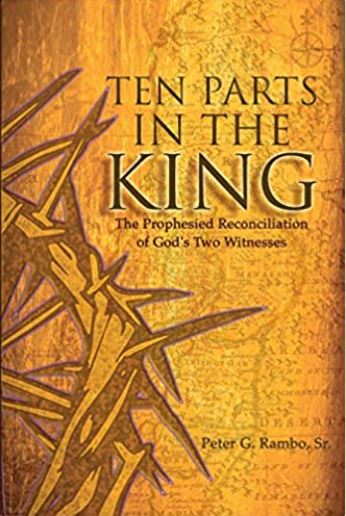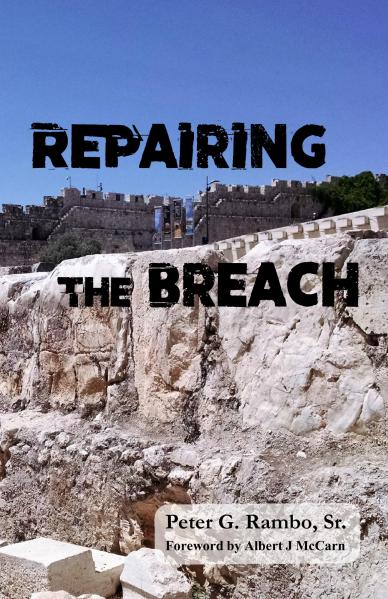Lately, this blog and James Pyles, of My Morning Meditations, have had a considerable amount of interaction. It really started with in the lengthy discussion after my negative review of Boaz Michael’s Tent of David and blossomed into a healthy discussion across multiple posts and an agreement to review and discuss the same book at the same time. I suggested JK McKee’s One Law For All  because it covers subject matter that is historically divisive, yet James and I firmly believe we can have spirited interaction without abandoning the Fruit of the Spirit.
because it covers subject matter that is historically divisive, yet James and I firmly believe we can have spirited interaction without abandoning the Fruit of the Spirit.
In that vein, I invite you to enter into discussion with the ground rule that we can agree to disagree, but we will treat each other with grace and kindness.
Several years ago, recognizing the number of divisive topics in the Messianic movement, McKee set out to create a series titled ‘confronting issues.’ While already being heavily published with a broad spectrum of Messianic scholarly works, this was a wise move, however, it sets up a small difficulty.
I really liked One Law For All, however, I’m not sure it can best be understood as a ‘stand alone’ book. Truly, there are so many related pieces that can’t be covered without turning the very pleasing 178 pages into a tome, that the book, while very readable and reasonably short on a difficult topic, seems to leave much on the table. Basically, it cannot be read and completely understood in a vacuum… I reached for his Acts 15 (which I have barely started) and thought back often one of his commentaries, Galatians for the Practical Messianic as well as to recently reviewed A Part of Israel?
McKee limited himself to five texts from the Torah that speak to ‘one law’ for the native and the ger/alien sojourner. While I was familiar with all five texts, it was interesting to gain new insight and perspective on each and how they affect the broader text of the Torah. In what I found was an even more interesting move, one I had not considered before, McKee has an extended discussion on the origin of ‘proselyte’ and demonstrates that there was no such thing in the Exodus and at the giving of the Torah.
But again, when did these procedures really take on significance and force? Not in the Exodus. The discussions about proselytes to ancient Judaism largely occurred contemporary to the ministry of Yeshua. (p.68)
My good friend, James, likes to remind me that the Torah wasn’t given in a vacuum and that we have to look at the context and culture within which it was given, all the while defending ‘proselyte’ as the standard for entering Judaism. I’m going to guess he did not enjoy this section as it will upset the idea that it took anything more than faith to enter the community in the years immediately following the giving of the Torah.
In fact, as McKee demonstrates, the ger/sojourner was expected to learn and grow in the Torah to come to maturity, however, interestingly, he was not required to be circumcised until he was ready to partake of Pesach (cf. Exodus 12:48-49 discussion). As I read and pondered McKee’s discussions on each passage it began to be very clear to me that the Apostles were against the proselyte system of Second Temple Judaism because it was layers of laws and expectations on top of the Torah. Adding to the commandments. No wonder Paul was so adamant. (Page 68 begins a discussion about circumcision and its rightful place in the life of the ger. It was not about national identity or salvation but was about “being the memorial sign of the Abrahamic covenant.”)
We’ll look at some details from these passages later. Other parts of the book struck me as much more important.
McKee is very gracious in his tone and often reminds the reader that non-Jewish Believers are to honor the Jewish people. One such example,
The inclusion of non-Jewish Believers as a part of Israel, the grafting in of wild olive branches to the olive tree, requires that they afford the Jewish people respect and honor – lest they themselves are cut off because of arrogance and disrespect. (pg. 50)
In keeping with this tone of unity and grace, McKee invests a considerable amount of time in the book ‘confronting the issue!’ What should ‘One Body’ look like? He addresses what he terms ‘Polarized Options: Divine Invitation and Covenant Obligation.’ Both of these extremes are ever present in the Messianic community, but McKee rightly identifies that if we are to move forward as One Body, we all need to carefully evaluate the extremes and move toward the middle that stands on much more Scriptural and theologically sound footing. No doubt, his strong words about both bilateral ecclesiology/Divine Invitation and Covenant Obligation stepped on some toes!! He got me at points and I don’t think I fit anything close an extreme. (As I read that section I thought, “Hmmm… James’ not gonna like that… or that, but he might like that… ” LOL! This co-review stuff is fun! 😉 )
In the end, I really felt he made a solid case/call for moderation, peace and learning to walk together in grace in the areas where we agree and allow the Holy Spirit to lead/teach and guide. He called his case/position ‘Supernatural Compulsion.’
…Obeying the Lord is neither an optional invitation (Divine Invitation) nor a mandated obligation (Covenant Obligation), it is a supernatural compulsion enacted by the perfecting activity of the Holy Spirit on the human soul….. A position of Supernatural Compulsion, for all of God’s people today following the Torah, can help us avoid the pitfalls of either thinking that obedience is not really expected of us, or that the Law is going to be forced down upon us as some heavy anvil to drag around. A position of Suprenatural Compulsion, emphasizing the work of the Holy Spirit, is undoubtedly impelled by a motive to love God and neighbor, the most important of the Torah’s commandments. [pg. 91; parenthesis mine, bold McKee’s]
Just a day or so ago, the discussion between Zion, James and I involved asking (paraphrasing), ‘what is the role of the Holy Spirit, v. tradition in interpreting/understanding Torah commandments?’ No doubt, that discussion will continue as we all have room to grow and there is, as James like to point out, a continuum with each of us at a different place of understanding. McKee admonishes elsewhere,
Unfortunately for many people who make up today’s broad Messianic movement, the distinctions which exist among God’s people are more important to be emphasized than the common traits that bind them together, and how we can all uniquely contribute to the well-being of the Body of Messiah. (pgs. 76-77)
Honestly, so much more than the discussion on Torah for the ger within the culture and context of the giving of the Torah, is the importance of McKee’s discussions about walking together in peace and charity. Over and over these spoke to me as the high points of a very good book that is solidly written and defended.
In order not to eclipse the importance of this call for unity and grace, I’ll reserve comments about some specific points for Part 2.




















































































































James’ review (part 1) is here.
LikeLike
It’s interesting reading your review after writing my own. Momentarily I felt like saying it’s as if we read two different books, but that’s not really true. The reality is that we chose to focus on different aspects of the same book. McKee does try to set an even-tempered tone over all and to balance competing priorities, but in the end, he sees achieving peace between Jew and Gentile now and ultimately in the (future) New Covenant sense, by what he calls “mutual submission” in which no one party has any ascendance or frankly, any real differences apart from the other. Part 2 of my review, which publishes tomorrow morning, addresses why I don’t think that’s very realistic or even Biblical. As with just about everyone else, I see McKee coming from his theological background and perspective. We each interpret the Bible through our own filters and it’s always easier to see the other guy’s filter than it is our own.
I look forward to your part 2, Pete.
LikeLike
Pingback: Book Review of J.K McKee’s “One Law for All,” Part 1 | Morning Meditations
I’ve not gotten too far in the book, but it’s funny how I saw some things that bothered me having nothing to do with OL or BE. No time to discuss today, but hopefully will set it up on a blog.
Keep up the good work both of you! This is a great discussion!
LikeLike
Thanks, Ro. Looking forward to your thoughts.
LikeLike
Hi Pete!
Not sure if I’ll get some of these thoughts into a blog, because my goal on Journey to Messiah is to help lead gentiles to understanding our Messiah is Jewish. Don’t want to throw cold water on new fires.
There are two things that bothered me:
1 – having nothing to do with OL or BE is his statement that there is no sacrifice for intentional sin. While that’s true, grace has always been evident in the Hebrew Scriptures. If a person commits an intentional sin, then comes to his senses and repents/agrees with God that it was wrong, he can now be brought back into the camp.
2- when McKee talks about Israel accepting/not accepting the Messiah, it sounds identical to a pastor I know who believes in replacement theology (though didn’t know it was called that.)
Can’t give you a page number because I’m using a Kindle version.
I’d also like you to take a look at a comment I made on James’ blog today and let me know what you think about my take on where I seem to be landing in this whole OL vs BE thing.
LikeLike
I’d have to say I wrestle with both of your thoughts/questions. Indeed, the Torah has no sacrifice for intentional sin, yet we see David and Bathsheba, Jonah, others in willful disobedience… Is there grace? Sure, but you would agree that the grace doesn’t give us license… so, it is a fine line.
On Israel accepting the Messiah, that, too, is a toughie from the perspective that rejecting Yeshua IS rejecting the Holy One of Israel!! Yikes! Hebraic thought, if I understand, allows for a ‘retread’ opportunity in the Millennial reign, but I struggle with Scriptural support. In the end, we are clearly told that only a remnant of the Jews and of the nations will be saved. Scary stuff! Personally, I have to trust that He who knows the hearts and is a Just Judge will do right.
I have not read James’ post, but did read your comment. Personally, I lean more toward OL (see my recent post ‘Ger, Chumash, Anachronism’ to see more evidence). Working on a post now that Father laid on my heart through circumstances this morning… Should be interesting fodder.
LikeLike
Pingback: One Law for All? Reviewing JK McKee, Pt. 2 | natsab
I look forward to when we all go home and are one nation u der Yah, indivisible…He will have 1 constitution for one nation/bride-not 2 constitutions for 2 groups otherwise He would have unjust scales and unequal measures.
LikeLiked by 1 person
Pingback: The ‘ger,’ the Chumash and Anachronism | natsab
I greet you in the name of Jesus Christ.
I have been doing much study for the last several months and have had spotty internet connection. I have been looking into this issue of the Law and have found that there can only be one law. A man named Marcus explained it better than any. I spent hours watching, I had to watch the series once, and then a couple months later watch again before I grasped what this Marcus was saying. Here is the site if you are interested http://www.servantking.info . The ones I watched were “confusion programs” and the “unraveled programs”.
LikeLike